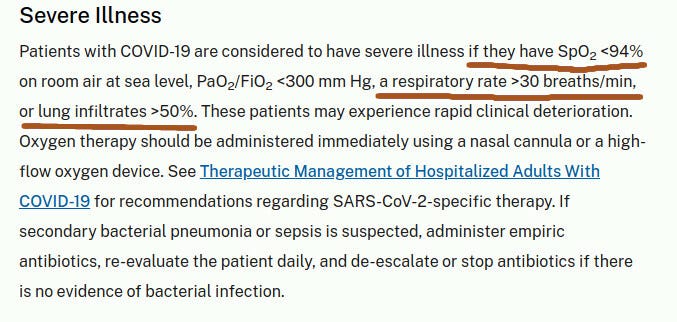Malaysia Study: Ivermectin helps with "Covid Lungs"
Patients already had "Covid lungs" -- but Ivermectin helped even with that
The Malaysia Ivermectin Study made quite a stir online. It was a randomized trial where 241 persons received Ivermectin treatment, whereas 249 persons only received “standard of care” treatment. Jessica Rose and myself wrote about it, pointing out that the study achieved remarkable reduction of death, specifically only 3 people died in the Ivermectin group, while 10 people died in the control group.
Last Friday, I wrote about 70% reduction of deaths in the Ivermectin arm. Today, we will question the main conclusion of that study — the conclusion that “Ivermectin did not prevent progression to severe disease”.
Sounds bad, right? What do they mean by “progression to severe disease”? Why didn’t Ivermectin stop that progression? Because it’s ineffective? Let’s find out.
“Severe disease” is defined by NIH (and I believe the WHO) as follows:
While many of us who had Covid had SpO2 less than 94% (I had less than 94% while sitting home at this computer and mostly feeling fine, even had 88% for an hour also sitting at the computer), I believe that the definition includes more than just low SpO2, per above. However, it can be described as “respiratory distress” and involves lung infiltrates (detected by radiography).
The study itself was mostly conducted at HOSPITALS (20 hospitals to be exact) and involved patients who came to the hospital on average 5 days after Covid diagnosis. In Malaysia, people do not go to hospitals without a good reason, right?
It is indeed quite obvious that these patients were pretty sick already!
66% of both groups were in “moderate” condition, which is worse than “mild” and is one step below “severe”.
What is worse, same 66% of both groups ALREADY HAD BAD CHEST RADIOGRAPHY — the so called “Covid Lung”! The numbers coincide, suggesting that the moderate condition solely was because of bad chest X-ray radiography.
The reason why they made it to hospitals (and half was offered ivermectin) is that they had serious pulmonary problems underway and worsening.
If so, is it surprising that 52 out of 158 patients in the ivermectin group, and 43 out of 165 control group members, who had bad lung radiography, proceeded to the “severe stage” shortly after admission?
How could ivermectin possibly help with that at all, given the timing of events? Of course, it could not. They already had lung damage and naturally, some of them quickly experienced further oxygen problems, with the difference between groups being fairly statistically insignificant (P=0.25).
Ivermectin is not a magic wand that can fix lungs already damaged by untreated Covid, in a day or two. What it can do is fix things once it has time to work — and here we do see the magic, indeed.
What Ivermectin helped with — because it had time to work — was preventing severe patients from going on a ventilator. In the Ivermectin group, 4 out of 52 patients in severe stage went on a ventilator. That’s 7.7%. In the control group, 10 out of 43 (23.3%) went on a ventilator. Would you prefer to be in the Ivermectin group where 7.7% go on a ventilator, or in the control group, where 23.3% went on a ventilator?
Even better is the death statistic. Repeating my previous post, 3 Ivermectin patients sadly died, vs 10 patients in the control group. That is 70% reduction in death!
Which group would you prefer to be in, if you were admitted to a Malaysian hospital? Ivermectin group or the control group?









Alex Berenson, are you reading? Or still too invested in trying to play “gotcha” with Dr. Robert Malone?
I've pointed out on a couple of Stacks that have discussed this study that 2/3 of the study pop were vaccinated, and there is no recording of how recent that was in relation to their COVID diagnosis. It's obvious at this point that vaxxing has a huge impact on immune status, so I don't see how this study has any validity with regard to other treatments. But the one thing you could compare is the totally unvaxxed participants. Among those, 1 died in IVM group, 3 in placebo. That's buried in the supplemental tables #6.